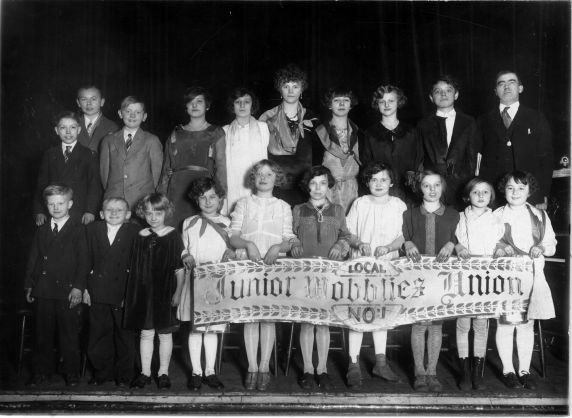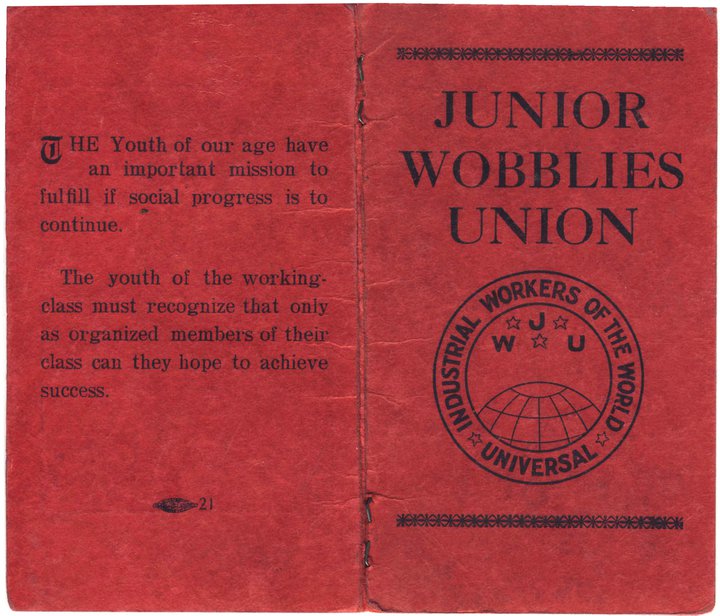Several factors played into our collective decision not to run a print issue of Perspectives on Anarchist Theory for the current year. We sincerely thank all inquiries and submissions sent for what was hoped to be an issue on Play. A call for submissions for a Beyond The Crisis print issue of Perspectives (2018) is here.
This is an article written by two Wobblies in response to our call for Play essays. These organizers bridge the gap between play and the practice of organizing skills via educational skits and fun activities led by the New Junior Wobblies, the young members of the Industrial Workers of the World (IWW).
The IWW globe logo holds three stars representing Education, Organization and Emancipation. This article looks at Recreation – a fourth star – from challenging uneven relations of power, to making joy central to organizing against capitalism, regardless of age.
Shortly after a wave of government repression and internal splits nearly destroyed the Industrial Workers of the World (IWW) as a functioning labor organization, a group of Wobblies felt the immediate need to find new ways to raise the next generation of revolutionary unionists. As a part of solidarity support for striking IWW coal miners in Colorado, children of union members were invited to join an IWW organization of their own. These Wobbly kids formed “locals” to organize support for their striking parents, and alongside them, develop a rudimentary understanding of the world and how they might soon be a part of organizing to change it. To the IWW tripartite motto, “Education, Organization, Emancipation” they added “Recreation,” and in 1927, the Junior Wobblies Union was born.

This effort to formally carve out a space for children in the IWW was lost as the union fell into obscurity, but with the IWW revival of the past few decades, old traditions have been revived. In 2011, the Twin Cities branch of the IWW reconstituted both the self-educational institution, the Work People’s College, as well as the Junior Wobblies. It began as a combination of IWW members coordinating childcare to enable parents to attend trainings, panels, and other IWW events. But as the network of Wobblies with kids grew, so did the desire to provide concrete ways for kids to engage with union activity.
In July, 2012, the Twin Cities put on the first Junior Wobblies summer camp in decades, hosting IWW children ages 2 through 12 at Mesaba Park campground for a week of games, outdoor play, and structured learning activities. The camp has continued annually ever since, drawing a larger crowd from across the US and Canada each year.
The Wobbly Take on Sleepaway Camp
The camp agenda and curriculum are designed by a national committee of the IWW, composed of educators and parents, who continually reexamine and refine their approach. Families stay in a large cabin, or if they wish, in their own tents. The majority of camp time is dedicated to open play for the children, which often includes swimming, canoeing, and small playgrounds for the littler kids across the large campground. Kids of all ages play with each other, and older children are guided to help the younger ones in the spirit of multi-generational solidarity, though they rarely require much encouragement.

About thirty percent of the children’s time is spent engaging in the camp program, facilitated by camp counselors leading the kids in understanding the lessons of the day.
These sessions are usually broken down into two age groups, and are structured around concrete, fun activities with an educational element. No summer camp would be complete without arts and crafts, camp songs, and a talent show, all of which take on a distinct IWW character. While play time facilitates older kids supporting younger ones, the talent show gives them an opportunity to perform just about whatever they can dream up, and also serves as an opportunity to stand up in front a group of listeners and speak with confidence, a crucial skill for future organizers. From the first day until the close of camp, the program is geared towards collective cooperation and living solidarity.
Each year, the camp curriculum is built around a theme. 2013 was “The Spanish Civil War,” 2014 was “The 1934 Minneapolis Teamsters Strike,” 2015 was “Organize Your School.” The 2016 curriculum was “Organizing Against Mass Incarceration,” to complement the recent upsurge in IWW organizing of incarcerated workers and the prison strike that began on September 9th, 1971 – the 40th anniversary of the Attica Prisoners’ Rebellion. As with the IWW’s Organizer Training, counselors use the Agitate-Educate approach, engaging the kids first on an emotional level, then providing the framework for them to form their own ideas about how to solve a collective problem. The camp sessions begin with stories about protagonists like truck drivers attacked by bosses, Spanish revolutionaries defending their collectively run factories, children stuck in the school-to-prison pipeline, or families with loved ones in prison. These narrative starting points are followed by activities that offer experiences that help children comprehend how to take collective action to fight back against exploitation and win a better world.
Play as Practice
The camp curriculum aims to present Junior Wobblies with the real issues of capitalism through stories and scenarios kids can understand and reflect on, in order to create a personal connection to these issues. The focus of the curriculum then moves from educating to organizing, as the Junior Wobblies practice being powerful through play in games, skits and scenarios that require them to face the likes of greedy bosses, abusive principals and unjust systems head-on.
At the 2016 Junior Wobblies camp, kids were divided into two factories, both of which made T-shirts. Kids had different jobs on the assembly line, some cutting out the cardboard “T-shirts,” others decorating them, others organizing the final product. The workers of each factory got paid with Monopoly-style dollar bills, but one group, the incarcerated workers, received only a fraction of the pay the “outside workers” got. Grownups who play-acted the capitalists in both factories were seen to receive more money than anyone when they sold the batches of T-shirts. The factory worker kids were able to spend their money at the supermarket which had granola bars, fruit, cereal, etc. The incarcerated T-shirt makers got to go to the commissary, where they had far less attractive options sold for much higher prices.
When encouraged to draw lessons from the system they were being presented with and come up with solutions to the problem, many of the “outside workers” went to the barrier separating them from the prison kids and tried to pass them food and money. Some of the older kids suggested tearing down the prison walls and bringing all the workers together. Over the course of the week, the campers learned about the torturous practice of solitary confinement and built a to-scale solitary confinement cell out of cardboard and tape, exploring the inside of it to understand its size and imagine this particularly cruel act of oppression. On the last day of camp, all the kids participated in the cathartic universal kids’ activity of ripping the whole thing apart. This served as the apotheosis of the 2016 Junior Wobbly Summer Camp, marrying pure play time with a literal tearing down of the carceral system.

In 2015, Junior Wobblies camp challenged the kids to “Organize their School.” Day one started with studying examples of students exercising their power, from the East LA blowouts of 1968 that called out the racism of the school system, demanding quality schools and an education that respected and valued Mexican history and culture; to present day examples such as the Philadelphia Student Union organizing to protect their schools from budget cuts amid the onslaught of privatization and corporate reform. The campers even got to hear from a 15-year-old Junior Wobblies 2011 alum who had become a student organizer at his high school, helping to organize walkouts both for increased school funding and in solidarity with the Black Lives Matter movement. The kids then got to work examining their own schools and generating demands ranging from “we want to be able to talk to our friends in the cafeteria instead of having silent lunch” to “ending the school-to-prison pipeline and suspensions of students of color.” The Junior Wobblies turned these demands into a zine encouraging kids everywhere, from kindergarten up through high school, to organize their schools.
The Junior Wobblies also got real practice organizing a student union, through play of course. They learned about the importance of gathering the contact info of the people you are organizing with, similar to their adult counterparts in the IWW’s Organizer Training 101 building skills to organize their workplaces. The Junior Wobblies broke into pairs, coming up with their own strategies to gather contacts (some explained their goals of a union outright, while others chose to circulate more innocuous petitions like “save the hedgehogs”). They held a contest through the entire camp to see who could gather the most contacts. The camp culminated in kids acting out their own skits of a “March on the Principal” to win their chosen demand of more recess time. While the “principal” may have been played by a willing adult, with the cabin’s living room transformed into his “office,” the Junior Wobblies got real practice working together to flip the balance of power in favor of the youth as they made demands, cheered and chanted, and marched in and out together.
To celebrate the 80th anniversary of the 1934 Minneapolis Teamsters Strike the Junior Wobblies learned about that struggle for the 2014 camp curriculum. The Junior Wobblies studied the Great Depression and the workers who struggled to free themselves and their families as the wealthy businessmen and members of the Citizens Alliance continued to live in opulence and wealth. Arts and crafts time involved transforming cardboard boxes into scab trucks that were being used to break the strike. In the final activity of 2014, camp adults donned the cardboard boxes, now turned delivery trucks, and attempted to make deliveries, breaking the Junior Wobblies strike. The Junior Wobblies had to work together to create their own flying picket, alerting each other when trucks were spotted around camp and assembling as workers to stop the deliveries, armed with sticks and water balloons. The Junior Wobblies connected the flying picket water balloon battle at camp with their own experiences participating in pickets for the IWW organizing campaign at Chicago-Lake Liquors, creating an early memory of the joy that comes from having the backs of your fellow workers and confronting power in the streets.
The broader perspective guiding all of this curriculum is to provide kids with “games” that have the effect of familiarizing them with actual skills, like muscle memory. They experience their power through play. If you’ve had the visceral experience of organizing, even just as a form of play growing up, then you can draw from that experience entering the world as a teenager and as an adult, when the tools of organizing become what you need the most, as a part of the working class, to struggle against exploitation and oppression out in the world—at school, in your community, and on the job.
While conventional schools value obedience and scripted curricula that teach to the test over critical thinking, our kids need practice both in critically examining the world around them, and in standing up to it together. While the capitalists socialize our kids to become future soldiers through PlayStation war games, we counter their efforts through games of our own that train kids for solidarity, communal struggle, and love.
Expanding the Program

A handful of branches of the IWW have adopted the Junior Wobblies moniker for their childcare provisions, or to arrange for regular playdates for IWW kids to hang out together. (As one Junior Wobbly mom frames it, Wobbly kids get to commiserate about growing up with uniquely weird moms and dads.) Some branches such as Los Angeles have attempted to adapt the educational model of the summer camps to their own support for union families by offering regular educational meet-ups for the local Junior Wobblies.
In this Junior Wobblies “Local,” kids get together to do mini-lessons that involve crafts, stories, and play time arranged around a particular idea. In the first session, attended mostly by kids under age 6, they read “Farmer Duck” by Martin Waddell, a picture book about a lazy farm owner who makes Farmer Duck do all the work while he lies in bed. The duck’s friends on the farm call a meeting and decide to run the farmer off the land so they can do the work together without bosses. After reading, the kids made animal masks and reenacted the story, then talked about some of its lessons.
In Los Angeles, kids get stickers in their red membership books when they attend a Junior Wobbly event, such as making picket signs at the IWW office, attending a meet-up, going to a demonstration, or just hanging out and having fun with each other while their parents attend a meeting. Meanwhile Wobbly moms and dads in LA take time to meet amongst themselves, discuss their own particular challenges raising kids within a capitalist, patriarchal, racist system, and develop the Junior Wobblies program accordingly. They are planning on holding their own West Coast mini-camp this year, to complement the annual event, which itself will be taking place outside Minnesota for the first time, in Winnipeg, a longstanding Junior Wobblies stronghold. The LA branch and the National Junior Wobblies Committee are working to export this model, with Atlanta, Pittsburgh, and other IWW branches beginning to establish their own Junior Wobblies groups now.
Final Thoughts
When the Junior Wobblies originally formed, no one could have imagined the depths to which capitalism would sink the American working class just two years later. Nor could they have predicted that a handful of generations later, the IWW would still be struggling to bring about the end of capitalism and the birth of the Cooperative Commonwealth, where the next generation could flourish and realize their full potential as human beings. In many ways we are rebuilding what came before, taking the best of the past and informing it with what we’ve learned since then. It’s a process not unlike that of raising children.

We want to realize the dream of being able to have fun all day and destroy forever that capitalist binary that defines work and play as a zero sum game. What we know now is that getting there might take more than one or two generations, and so we prepare for that possibility with the Junior Wobblies. But as we do, there’s something we can learn from the kids as well. Being a revolutionary should also be fun. That’s a lesson too many of us have forgotten in our adulthood. If we want to build a movement that sustains itself and grows, then we can’t only offer meetings and structure and a channel for righteous anger. Our organizations should be the space that fulfills us and restores us, and that means they should be places where, as unlikely is it can seem, we actually enjoy ourselves and have a good time. As is always the case in revolutionary movements, the youth point the way forward.
* * * *
If you would like to support the Junior Wobblies Union, please make a donation here! Every dollar donated goes towards helping a Junior Wobbly attend the summer camp via grants for travel expenses. Thank you in advance!
Sadie is an education worker and IWW organizer in the Twin Cities. Her elementary students demand that she respect the importance of play.
MK is a Wobbly of 16 years, and the secretary of the Los Angeles General Membership Branch. He works as a writer and has two Junior Wobblies of his own.
Both are members of the Junior Wobblies Union Committee, IWW.
The views expressed herein solely belong to the author(s) and are not necessarily representative of Perspectives on Anarchist Theory, the Institute for Anarchist Studies, or members of its Board of Directors.
1 thought on “The Fourth Star: The New Junior Wobblies and the Next Generation of Union Militants, by Sadie Farrell and M.K. Lees”
Comments are closed.

Reblogged this on Industrial Workers of the World Dorset.